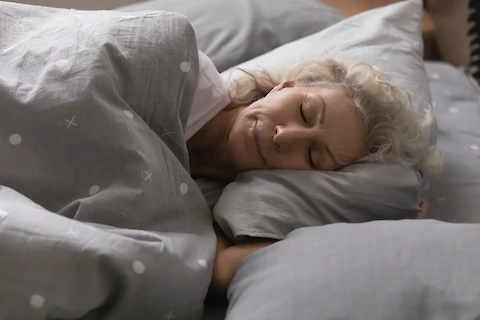
As the days shorten, maintaining a refreshing sleep schedule can become challenging, especially for seniors. The colder months bring about unique obstacles that may meddle with the sleep patterns of our older loved ones, extending from the absence of natural sunlight that influences circadian rhythms to the discomfort instigated by plummeting temperatures. Discover practical advice and effective strategies to help seniors in the San Gabriel Valley and beyond stay rested and rejuvenated during the cold season.
The Impact of Colder Months on Senior Sleep
The change of seasons can have a profound effect on our sleep. As sunlight dwindles, our circadian rhythms—the internal clock that regulates our sleep-wake cycle—can be thrown off balance. For seniors, this disruption might be even more pronounced, potentially leading to insomnia or disrupted sleep. Notably, alongside the reduced daylight, the colder temperatures can cause discomfort during the night, leading to further sleep disturbances.
Creating a Cozy Sleep Environment
Crucial to combating cold-induced sleep disruptions is creating a cozy, warm sleep environment. It all starts with managing indoor temperature. Consider using programmable thermostats that can automatically adjust the heat throughout the night. However, be cautious not to overheat the room, as this can lead to restlessness. Aim for a bedroom temperature around 65 degrees Fahrenheit, often cited as optimal for a good night's sleep.
Also key to maintaining a comfortable sleep environment is choosing appropriate bedding and sleepwear. Warm blankets and flannel or fleece pajamas can add layers of warmth without overheating. Lastly, ensure the sleep environment is quiet and dark. Using eye masks or installing blackout curtains can block out early sunrise or street lights that could disrupt sleep.
Maintaining a Consistent Sleep Schedule
Despite the changes in daylight, it's critical to stick to a regular sleep schedule. Heading to bed and getting up at the same time daily can help with internal clock regulation. Plus, it promotes improved sleep overall. If daylight saving time impacts your routine, try adjusting your bedtime and wake-up time by 15-minute increments until you're back on track.
Moreover, a relaxing pre-bedtime routine can signal your body that it's time to sleep. This could include reading a book, listening to calm music, or a gentle stretching routine. Avoid stimulating activities and electronics close to bedtime, as they can hinder your sleep.
Boosting Sleep Quality Through Light Exposure, Physical Activity, and Diet
Managing light exposure is another important aspect of improving sleep quality. Try to get regular exposure to natural light during the daytime. Even simple measures, like opening curtains or taking a short walk outside, can be beneficial.
Physical activity is another powerful sleep aid. It should, however, be tailored to your abilities and doctor's advice. Regular, moderate exercise, like a daily afternoon walk, can help you sleep better by decreasing stress and helping you feel more tired at bedtime. Ensure you have a conversation with your doctor first before starting any new workout regimen or activity.
Lastly, diet plays a significant role in sleep. Heavy meals close to bedtime can lead to discomfort and disrupt your sleep. Include more foods rich in tryptophan, magnesium, and calcium in your diet, such as dairy products and green leafy vegetables, known to promote better sleep.
Connect With Senior Helpers San Gabriel Valley
Getting a good night's sleep during the colder months takes a little extra effort but is immensely beneficial for our health and well-being. By following the above advice, you can enhance your sleep quality significantly.
If you or a loved one in Covina, Arcadia, Pasadena, or La Cañada Flintridge are facing sleep challenges this winter, contact us at Senior Helpers San Gabriel Valley. Our professional caregivers are skilled in providing support and advice to help seniors maintain a healthy and restful sleep schedule no matter the season.